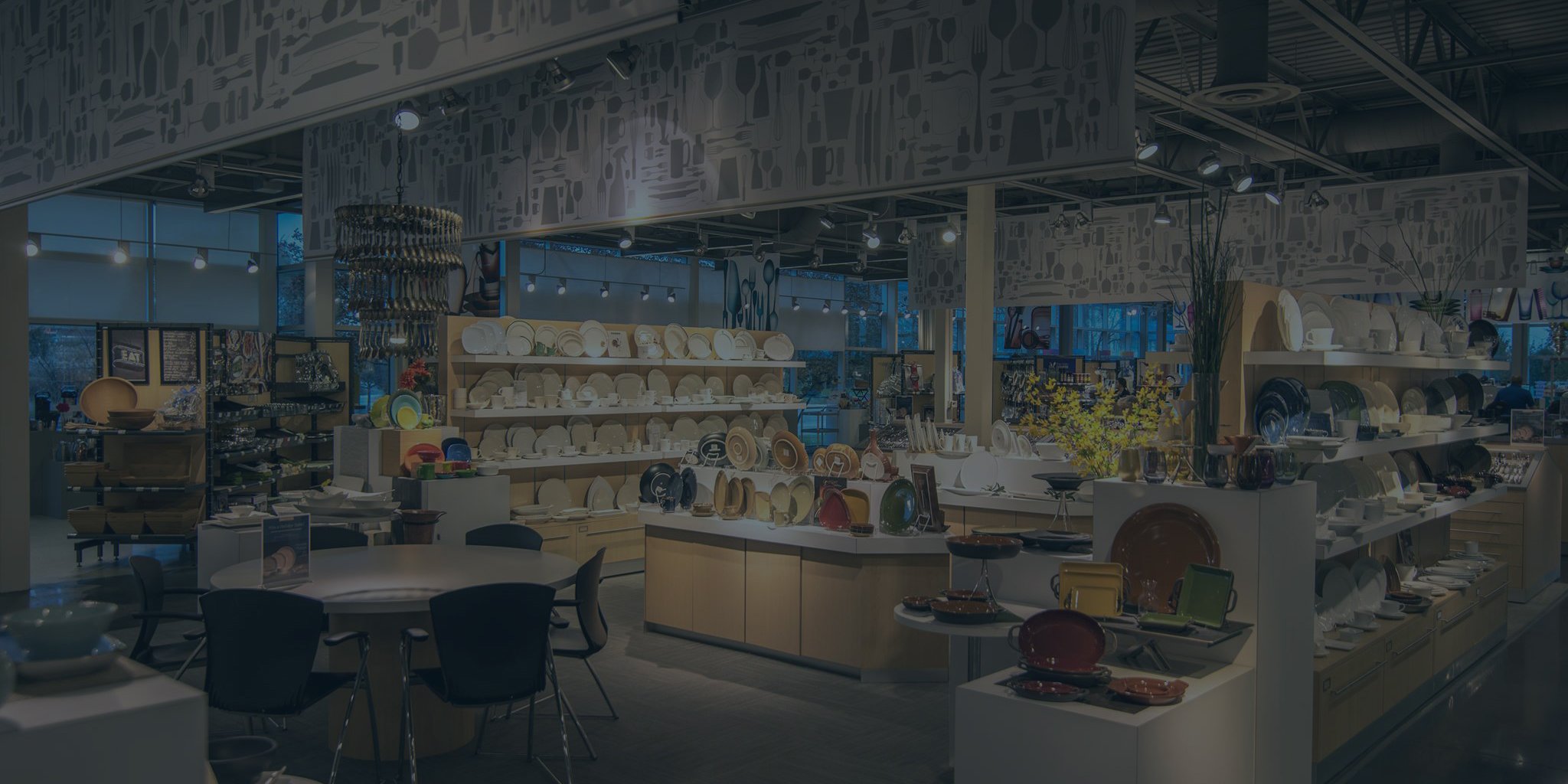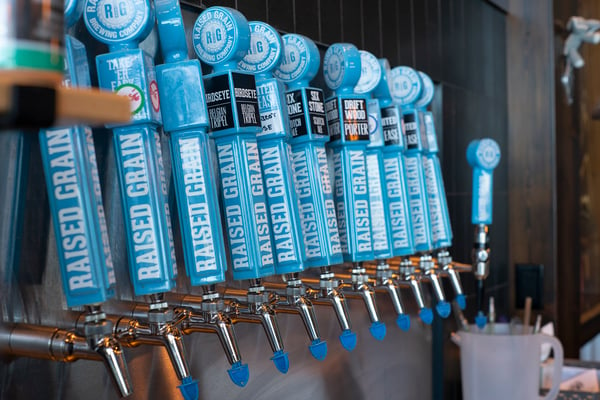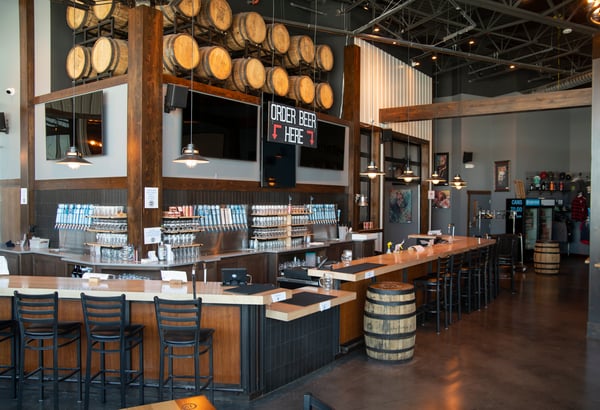In this episode, Lance Taylor, field sales manager for Boelter, speaks with Nick Reistad, co-owner of Raised Grain in Waukesha, Wisconsin. Paying homage to his father's woodworking shop, Raised Grain signifies the craft of their doctor brewers that are focused on elevating grain to its most distinguished form that can be experienced in the beer they craft.
Want to see what we can do for you and your brew? Get in touch. Check out more of our products, or hear Lance chat about all things growlers in our previous episode: Talkin' Growlers.
Have a topic you'd like us to discuss? Send us your ideas at marketing@boelter.com!
Excerpts
Lance Taylor: We'll get into your story a little bit in our discussion here and obviously, you know, you've went from gone from one location to the next and so we're kind of excited to kind of dive into what makes you guys so successful and obviously that attitude that you just shared right there is part of it. So awesome. Happy to hear it. I guess really what we want to discuss is with The Boelter Wire podcast, we just discuss many different perspectives and different industries that we do work with within Boelter as a company. And so, this is a great opportunity to really just dive into the brewing industry, which is one of our major industries that we serve and what better brewery to work with than the one just down the road from us. How did you guys start? How did the idea of a brewery begin? When did you begin, if you don't mind just kind of sharing the, the origin story?
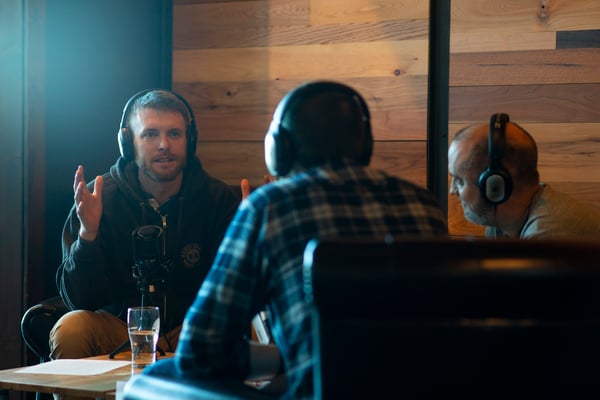
Nick Reistad: Raised Grain started probably in the back of my mind when I was a professional cyclist in a past life. So I got to travel around the world racing bicycles, doing bike races over in Europe. I was on the national team for three years. That was based in a tiny house in a small village in Belgium. So, the only thing to do at the end of the day was to head down to the square and have a nice Belgium beer.
That was in 2005, 2006. Then I raced stateside for a year as well. But you, you go there, you have those beers, you come back. And then that was right when the craft scene was just starting to take off. I started to notice that there were other really delicious, very different beers that were all over the U.S. When I travel out to California or San Diego or somewhere in the Northeast trying all these different beers from breweries that, in some cases had been around for a long time and other cases were just starting up and getting things figured out.
In 2009 after racing, and I think it was something like 15 countries, and I was actually getting paid to do that, I ended up having a career change, when I was 27. So I got into advertising and, I guess the excitement that I had become accustomed to wasn't really there even though I really like advertising marketing. So, I started thinking, what am I going to do with my life, and wrote a business plan for a brewery because it seemed like it would be fun to do, and it entertained me. And what I really liked about beer is that it's something that brings people together. So I started working on a business plan, connected with a neighbor of mine from when I was growing up and he knew two guys that are still doctors to this day, but they're also brewers. So, he brought us together on September 14th, sorry, September 19th, 2014. And I'm the young guy in the group and at 4:00 AM I said, guys, I got call it a night. And that's really where it took off. We hit it off, we were hanging out in Scott – one of the two doctors basements – and he had just a fascinating homebrew system of eight beers on tap in his basement and we're trying all of these. They were fantastic, delicious. We still have a number of them on tap today in the tap room and out in distribution in the market. They were excited and wanted to open a brewery. Scott's a dermatapathologist. It's easier to say after you've had a couple. Jimmy's a vascular physician and then, our other partner, Kevin, is a successful local entrepreneur. So, it's a really good team. We've got the science, we've got the marketing, advertising and we have a lot of fun together.
That's awesome. Very cool. That's definitely a unique story. That makes a lot of sense. Do any breweries in particular inspire you? Like when you were saying you're on the East coast or West coast?
Nick: It's hard to say. I think they all, they all each have their own little impact. I mean you're drinking West coast IPAs when you're out in California. And I spent the better portion of each beginning of the year out in California. That's where the races were. That's where, the scene was if you're traveling up and down the coast, whether you're in San Francisco, San Diego, LA, in between.
There were all these hoppy beers that I was trying and um, I don't even know if I remember some of the breweries that I was at, at that point. Because you're flying in. And it wasn't like I was drinking too much cause I'm racing bikes at that point. You gotta you gotta focus on what you're doing.
Yea, like feel good the next day?
Nick: Yeah. You taste these flavors and they’re like flavors I'd never tasted before. Over in Belgium, they always corrected our pronunciation, Bruin was one of the favorite ones or Bergen. So, you can get those here now. But when I came back in 2005, I ended up paying about a hundred Euro in extra baggage fees because I had so much beer to share with my dad.
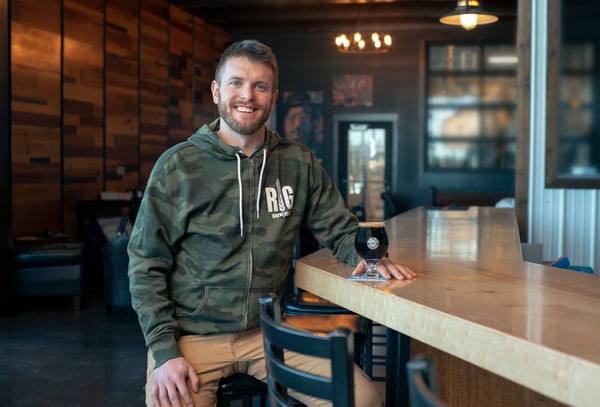
Yes. That is such a cool organic story. And that lends itself to a lot of the styles that you guys brew now too, obviously. I'm curious, when you first sat down, with the doctors and you guys were having some of those beers, some of the eight that were on draft right away, and you said that you still have some of them. Are any of those like the flagships of today still like the Naked Threesome or Paradocs Red?
Nick: Naked Threesome didn't come around until later and I don't think that style had even been invented yet in 2014 the hazy IPA, maybe it had. Paradocs Red was one of the, the ones that we were drinking that night and they named it that after themselves, a pair of doctors. Scott and Jimmy started brewing, I think it was about five years before I came along. They started brewing together and Paradocs was the third beer that they brewed together, and it was the first all grain recipe that they brewed on the system that was down in Scott's basement. And then fast forward a couple of years, that won a gold medal at the great American beer festival. That was pretty cool. And we've just been in growth mode ever since we opened our doors in 2015. So, I think it was 2016 we won that, and we were building out a food truck. I was heading off to an October Fest then. We had about five minutes to high five each other and celebrate and then it was back to work.
Right. You gotta keep going. You started in one location, moved into this nice new beautiful brewery and tap room. What is that transition like? I mean it seems like there's probably a lot that is in entailed in that. Can you kind of talk through that? And primarily, I mean you obviously have your fans and people who really like the brewery that started at the original location. How did you kind of communicate the, you know, the move and keep your consumers in the know with that?
Nick: So, about a year and a half into our original location, we were brewing on a seven barrel, all electric system, only had a few fermenters, and we, we knew we were going to hit a ceiling and then a few months later we were, probably over capacity or under capacity, whatever the case is, where we would literally run out of beer in our cooler every week. We're praying for a weekend of rain so we can catch back up because we have orders to get beer into the baseball stadium. We knew we had to squeeze that brew in, but we're just flying through beer so quickly. We also had reached a kind of the threshold for the amount of people we could fit into our tap room. It was a small space, 4,000 square feet all in that included offices, restrooms, cold storage. We were just really tight and then we'd throw our anniversary parties and get a couple thousand people to come in and we had to grow that year, after year and big tent outside. So, we knew we needed a larger space. So about, about a year and a half in we started looking for another place where we could put in a big brewery that we could grow into and then a tap room that would allow us to feature the beers that we have and who we are as a brewery. So, we landed on a spot about a mile and a half away and we figured we're not going to really lose any customers by moving a couple miles down the road. When we got to the transition point, we just picked a date and it was early December. We closed for a week because we had to pull a lot of equipment out and move it over and then said, we'll open up at the new spot. People knew that we had been under construction, so they're wondering when we're going to do it. We didn't know because we had a lot of work to get done. So we just said, you'll know when you come and you pull on the door and it's unlocked. And then we had some big stickers printed and we just slapped them on the outside of the door with directions to our new spot.
It worked out pretty well. We've got a, a healthy Facebook following and we've got a robust email list. So, we were just able to blast that out. We hit the ground running in December, which is not necessarily the best time of year to switch over. We were excited to showcase our new facility and, just get it in front of people so that they could enjoy and get beer for the holidays, bring in their family and show off their brewery. It was an exciting time.
Absolutely. Yeah. That's awesome. And that's a good point. Putting it that way, like their brewery because I mean really people do take pride in, in their city’s brewery I think quite a bit, especially when people come into town. Like let's check it out.
Nick: Yeah, when we first opened up, just this tiny little brewery out in the burbs outside of Milwaukee, we had so many people come in and say, thank you for choosing Waukesha. We want to have something like this out here and your beer is awesome and you guys are nice people, so thank you so much
Absolutely something that the city was missing. I grew up in Waukesha, so you know, I take pride in it as well. You talked a little bit about having a food truck at the initial location. Obviously you don't have space for a kitchen. Now you have a little bit more room to play with and you've made the decision to have the full kitchen. I know plenty of people who come in for the food, you know, primarily at some points and then, you know, have a beer or two.
Nick: Well, for your listeners that know where Wisconsin is, we're in the Northern half of the United States and it tends to get a little cold in the winter months. There were a couple of days where we had to close the food truck because we couldn't get water out to the truck where the pipes were frozen. It was a very precarious situation because we've got hoses, it's not hard piped. It's not hardwired. We could hook it up and pull it away at any point if we wanted to. Even though it ended up being a stationary food truck out back. We had to close it down when it was super, super cold and there was nothing you could do. Our chef and our cooks were really tough because it would get cold in there. When we were open, their feet would get cold and there's no insulation on underneath. So, we, we tried to insulate the trailer as best we could. On hot days it would just get super, super hot because in the summers in August, it's 90, 95 degrees, super humid. So they experienced both ends of the spectrum and we figured we'd be nice to them when they, they came over to the new place and we built the kitchen out. I mean we went from 4,000 square feet all in including brewery and everything to having a tap room that's about 5,000 square feet. So, we knew we need to have a larger kitchen.
Looking for tap handles? Check out our offering.
It is definitely spacious in here and all the windows just makes it look even bigger and you know, the natural light even on a balmy what, negative two or whatever it is.
With some of the names of your brands and flagships, you've got some quite fun ones. When I go to a bar, it's fun ordering a Naked Threesome, it always raises an eyebrow, that's for sure. Some of the naming conventions, how did you come up with some of them? Paradocs Red we already covered. But what's that like with your team? Does somebody comes up with it, do you let the brewer come up with the name? Is it more on your end with the marketing side?
Nick:
It comes from all over, Paradocs was easy because that tells the story. Usually, brainstorming involves a couple of beers.
Throwing a lot out there that have either been taken already ready, which is most likely the case. Something that conveys the experience that you want the customer to have when they're drinking that beer. Naked Threesome is a little bit of a unique story because that one came out of a series we were doing when we wanted to play around a single hops. We started a series off that we brewed three single hop beers and then we wanted to combine those three hops at the end into the culmination of the series. We started calling it the Naked Hop series, really clean malt beer, showcasing the hops that we were using. Then we're kind of a ready fire, aim type group, or at least we were in the beginning, where we rolled out the series. We didn't really think what the final beer was going to be. Scott, my partner wanted, I don't, I don't even remember what it was, but I wasn't keen on it. I wasn't really coming up with any good ideas. Then our bar manager at the time came up with a name and, and said, what if we called it the Naked Threesome? We both looked at each other and said, well, we'll need to check with our wives on that one. They laughed and said, sure, do whatever you want to. It's about the three hops. We ran that series a couple of years and then we brewed the series into the beer that it is now. It was a huge hit. People loved it. Couldn't get enough of it. We couldn't brew it fast enough. We ended up killing the series that it evolved out of and just keeping the Naked Threesome as it is today.
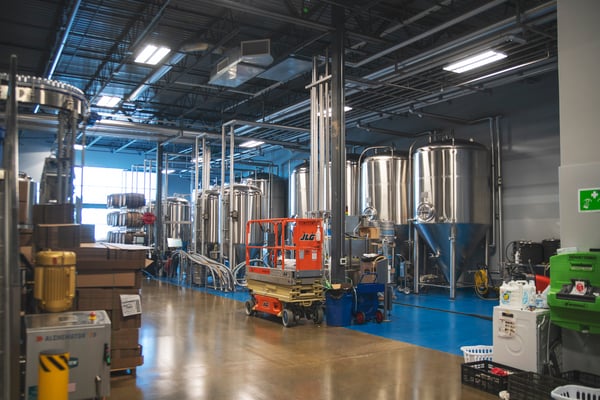
Is that your top seller?
Nick: It is, yeah. It's about 30% of our production. Then we have quite a few other other beers that round it out.
The tap room obviously has good food, good beer. What if people haven't been here before and they already know that everything is fantastic. What are ways that you bring people into the tap room? I mean, I know you said social media, but what events do you host or activities?
Nick: We designed the space so that we can host any number of events, whether it's just a Friday night and we're busy and we want to make a comfortable environment for people or we specifically sized our beer hall, so you can set up bags, sets or cornhole, whatever you wanna call it. So that you have enough length to have an official court. When we got the plans back from our architect, we had her elongate the room a little bit so we could fit in bags. It's everything from corporate events to birthday parties, all sorts of events that are coming in to use the space we have. We wanted to create different experiences within the tap room. So if you come in and you want more of a traditional dining opportunity, we have that. If you want super casual at the bar, we've got that. And then we're sitting in the brewers lounge right now.
It's very, very casual. You can sit back and have some private conversations with your friends or coworkers or whatever the conversation is and just feel really comfortable. Whatever you want, you could come in on different nights and have different experiences all within the same tap room. That was something that we wanted to create because it isn't a relatively new building. When we first walked in, it was just wide open. So, we didn't want to have people walk into a warehouse and feel like there's just gusting wind.
That was something we wanted to avoid. I think we've done a pretty good job of breaking up the space and making a cool, a cool spot for people to come and hang out.
Absolutely. I mean you guys did a fantastic job in here and one thing that Boelter kind of talked about is the whole concept of premiumization. What that really means exactly is just making a much better experience and how do we go about making something more of a premium experience. With the new location and everything it's beautiful in here. You definitely have a nice feeling when you come in. What steps do you take to make sure people have a premium experience and is that something that really crosses your mind?
Nick: I would say it's the only thing that crosses our mind. We have an expense to produce beers, so you have to charge what you need to charge to make it work on the backend, on the production side. Outside of the beer, you've got to have a premium experience when you come in. So we have an awesome staff behind the bar. A lot of our beer tenders are just really well educated on beer and they work here because they want to work here and they have fun working here. That really shines through when a customer walks in, they have an awesome experience because the person on the other side of the bar wants to tell them about the beer that they're drinking and wants to make sure that they're just having an awesome time. I think that really helps beyond the physical side of things because we just have awesome people shining through and every time you come in, you're going to have that interaction that elevates what you're doing, and it gives you a fun time.
Yeah, absolutely. I would agree. From my experience with you and being able to label some things and the glassware that we've been able to do for you guys, you have very specific glassware chosen, which on my end, obviously being a glass geek, that makes a huge difference. If you're drinking out of a stemmed glass and it's a higher ABV, then you're sitting in this brewers' lounge part, you can kind of swirl it around really enjoy it. I would say that it absolutely adds to it as well. What kind of advice would you have for anyone, any other brewers? Or anyone that's thinking about getting into it, especially in this day.
Nick: Advice for people getting into it, you're going to work hard, harder than you probably ever thought you'd work. If that's what you're looking for, you'll probably have a good go at it. As far as other brewers, I don't know. I'm looking to them for advice
Sure. That's a good point. Very interesting. Right? I really appreciate your time, Nick. I wish you guys all the best success and moving forward and look forward to seeing what 2020 looks like for you guys. I know you have some exciting new products coming out. Is there anything that you want to push while you've got an opportunity here or anything to promote or anything you're excited about?
Nick: We're just excited to be in craft beer when it's growing and it's fun and exciting for not only us but for our customers as well. It's a cool time and it's been a cool project to work on and we're looking forward to five more years and five beyond that.
Want to chat with a Boelter expert? Get in touch!
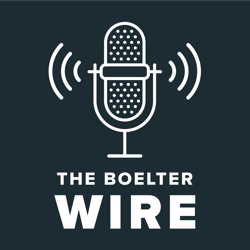
The Boelter Wire is an episodic podcast that focuses on thought-leadership conversations with industry experts and established partners, and is designed to help listeners evolve their business, stay competitive and pursue their passions.
Subscribe to The Boelter Wire here or on Spotify, Google Play, Apple Podcasts or Amazon Music.
.jpg?width=192&name=BLT_Only_Logo_Black%20(19).jpg)
